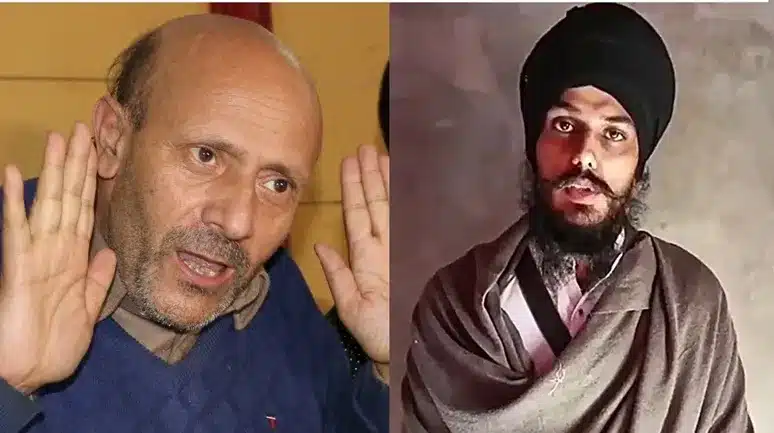What’s in today’s article?
- Why in News?
- What are the charges on both the leaders?
- What happens when jailed leaders win polls?
Why in News?
Jailed leaders Amritpal Singh and Engineer Rashid, who ran as independent candidates in the Lok Sabha elections, have won the election.
Both the leaders are currently in prison on serious charges that are being probed by the National Investigation Agency.
As per the Indian laws, despite facing criminal charges, they were eligible to contest election unless convicted. However, like other accused persons in Indian prisons, they were barred from voting in the recently held elections.
What are the charges on both the leaders?
- Amritpal Singh
- Amritpal Singh, the leader of Waris Punjab De, was arrested in 2023 under the National Security Act (NSA) after going into hiding during a crackdown on his Sikh separatist group.
- The NSA is a law that allows the government to detain people for up to 12 months without formal charges.
- He has been in prison in Dibrugarh, Assam, since then.
- Amritpal Singh, the leader of Waris Punjab De, was arrested in 2023 under the National Security Act (NSA) after going into hiding during a crackdown on his Sikh separatist group.
- Engineer Rashid
- Engineer Rashid, a two-time MLA and founder of the Jammu and Kashmir Awami Ittehad Party, won the Baramullah seat against former Chief Minister Omar Abdullah.
- He has been in jail for the past five years.
- Rashid was arrested in 2019 under the Unlawful Activities Prevention Act (UAPA) on charges of money laundering related to terror funding.
What happens when jailed leaders win polls?
- Even though they are in prison, winning the Lok Sabha elections means Amritpal and Rashid are now parliamentarians.
- Now, they have a constitutional mandate as parliamentarians, which starts with them taking oath.
- Taking Oath as Parliamentarians
- Taking oath is the first step for Amritpal and Rashid to fulfill their roles as parliamentarians.
- Although not explicitly stated in the Constitution, jailed lawmakers have been granted temporary parole in the past to take their oaths.
- Past Instances of Parole for Oath Taking
- Sanjay Singh (March 2021)
- The Aam Aadmi Party leader, imprisoned in Tihar on money laundering charges, was granted permission by a court to take his oath as a Rajya Sabha MP for a second term.
- The court directed the jail superintendent to ensure his secure transport to Parliament and back.
- Akhil Gogoi (2021)
- After winning from Sibsagar, Assam, an NIA court allowed Akhil Gogoi to temporarily leave prison to take his oath as a member of the Assam Legislative Assembly.
- George Fernandes (1977)
- The trade unionist was elected from the Muzaffarpur seat while in jail during the Emergency.
- He was released from prison before the oath ceremony.
- Duties as a lawmaker
- Being allowed to take the oath is not the same as being released on bail. It is more like a special parole for a day.
- After taking the oath, the jailed lawmaker must write to the Speaker to explain that they cannot attend the proceedings.
- This is crucial because Article 101(4) of the Constitution states that if an MP is absent from all meetings for over 60 days without permission, their seat will be declared vacant.
- To attend a Parliament session or cast a vote, the lawmaker must get court permission.
- Disqualification from the Parliament
- Section 8 of the Representation of People Act, 1951 (RP Act) is titled “Disqualification on conviction for certain offences”.
- It mandates that individuals convicted of specified offences are disqualified from contesting elections to Parliament or state legislatures from the date of conviction.
- Hence, as per the current law, only a conviction and a sentence of two or more years will lead to disqualification from Parliament.
- Additionally, they face a six-year disqualification period from contesting elections, starting from the date of their release.
- Sanjay Singh (March 2021)
Q.1. What is National Security Act?
The National Security Act is an act by the Indian parliament promulgated on September 23, 1980, solving the purpose of preventive detention law. It allows the central government or a state government to detain a person to prevent him from engaging in any kind of activity that might jeopardise national security.
Q.2. What is parole?
In India, Parole is a temporary release granted on account of contingency and after the period of parole is over the convict has to report back to prison to undergo the remaining part of his sentence.
Source: Amritpal Singh in Punjab, Engineer Rashid in J&K win from jail: What happens next | Deccan Herald | Indian Kanoon
Last updated on December, 2025
→ Check out the latest UPSC Syllabus 2026 here.
→ Join Vajiram & Ravi’s Interview Guidance Programme for expert help to crack your final UPSC stage.
→ UPSC Mains Result 2025 is now out.
→ UPSC Notification 2026 is scheduled to be released on January 14, 2026.
→ UPSC Calendar 2026 is released on 15th May, 2025.
→ The UPSC Vacancy 2025 were released 1129, out of which 979 were for UPSC CSE and remaining 150 are for UPSC IFoS.
→ UPSC Prelims 2026 will be conducted on 24th May, 2026 & UPSC Mains 2026 will be conducted on 21st August 2026.
→ The UPSC Selection Process is of 3 stages-Prelims, Mains and Interview.
→ UPSC Result 2024 is released with latest UPSC Marksheet 2024. Check Now!
→ UPSC Prelims Result 2025 is out now for the CSE held on 25 May 2025.
→ UPSC Toppers List 2024 is released now. Shakti Dubey is UPSC AIR 1 2024 Topper.
→ UPSC Prelims Question Paper 2025 and Unofficial Prelims Answer Key 2025 are available now.
→ UPSC Mains Question Paper 2025 is out for Essay, GS 1, 2, 3 & GS 4.
→ UPSC Mains Indian Language Question Paper 2025 is now out.
→ UPSC Mains Optional Question Paper 2025 is now out.
→ Also check Best IAS Coaching in Delhi

















